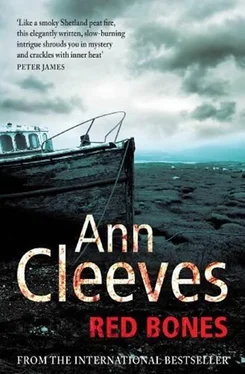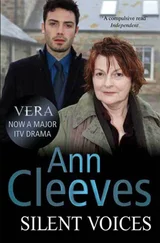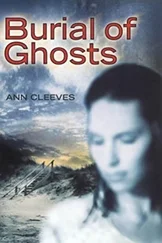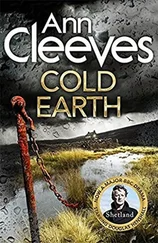The mist had cleared even more and now there were just a few threads of cloud flying in front of the moon. It was so light it felt like the simmer dim of a midsummer night.
‘When I was a teenager I got it into my head that the Norwegian could have been my father,’ Joseph said. ‘I heard things about my real dad I didn’t like so much. There were stories he beat Mima up. But the Norwegian couldn’t have been my father. The dates don’t work. I wasn’t born in the war.’
And you look so like Jerry , Sandy thought, remembering the photo that stood in Setter. You couldn’t be anyone else’s child.
‘Do you think your father was drowned at sea?’ Sandy asked. The question came into his head unbidden.
Now Joseph turned. ‘That’s what I was always told,’ he said.
‘I don’t understand why you have to get rid of Setter,’ Sandy said. Was he being stupid? Too thick to understand? ‘Why now? When you were so set against selling it, when you hate the idea so much that you’re prepared to set fire to it, to get the insurance instead of selling it on?’ Because it seemed to Sandy that money must come into it somehow. Money was always important in Whalsay.
‘That’s not my story to tell,’ Joseph said. ‘You’ll have to ask your mother about that. Now come home. You can’t stay in Setter the state that it’s in.’
‘I’ll tell Mother it was me,’ Sandy said. ‘A chip pan. She knows I was drinking.’
Joseph didn’t say anything. He put his arm around his son’s shoulder and they walked together back to Utra.
Sandy had to suffer a lecture from Evelyn the next morning about the evils of drinking and frying chips in the middle of the night. ‘You could have been killed. You could have burned the house to the ground!’ He thought about his father and made a pretence of looking contrite.
He hadn’t slept well. The amount he’d had to drink, you’d have thought he’d be out like a light, but ideas had been churning round in his head all night. He’d tried to rerun the conversation with his father. The earlier part of the evening he remembered fine: drinking in the bars in Lerwick, his arm round the shoulders of that fat lassie, the one married to the soothmoother who worked in the canning factory. Then turning up like a fool on Perez’s doorstep. He’d been pretty sober by the time they got back to Whalsay. At least, he thought he had been. But the details of finding the fire, standing with Joseph in the moonlight by the loch, all that seemed harder to pin down. It was as if he’d dreamed it all. Perhaps he didn’t want to remember the way his father had been last night.
Evelyn put a bacon sandwich and a mug of coffee in front of him. Joseph was already out; he’d been gone when Sandy got up.
‘Will you not sit down and have some breakfast with me?’ he asked. His mother was busy with three things at once as usual. She buzzed round the kitchen like a bluebottle trapped in a jar.
‘I had my breakfast hours ago.’
‘Then just sit down and have a coffee!’
She looked at him strangely but she did as he said.
‘Why has my father changed his mind about selling Setter?’
‘He realized it made sense. What would he want with an old house?’ Sandy recognized the tone. She was all bluster and bravado, like some teenage lad who’d stolen a car and driven it into a ditch.
Sandy shook his head. ‘He loves the place. He grew up there. He doesn’t want it full of strangers.’
‘That’s sentiment,’ Evelyn said. ‘You can’t eat sentiment.’
‘He said you’d tell me what this was all about.’
She paused for a beat, stared at him sadly for a moment. ‘Oh Sandy, you’re the last person I could tell.’
It was as if she’d slapped him in the face.
The phone rang then and his mother went to answer it. She came back frowning. ‘That was your Auntie Jackie. She wants to know if you could go up to the big house. Andrew’s fidgeting to talk to you, she says.’
‘Aye. Why not? I’ll walk over.’ He knew he was a coward but he couldn’t wait to get out of the house.
Walking up the track to the Clouston place, he did feel better. There was a wheatear bouncing along the stone wall and skylarks singing in the field beyond. He found Jackie in the kitchen. The table was full of clutter – bags of flour, sugar and oats, tins of syrup and treacle. ‘You look busy. Is this for something special?’
‘Evelyn’s asked me to do some baking for her grand do in the hall,’ Jackie said. ‘I thought I’d make a start today. Anna’s helping me out.’ Then Sandy saw that Anna Clouston was there too, sitting in the corner. She was breastfeeding the baby. You couldn’t see exactly what was going on because she was wearing a loose jumper, but he felt embarrassed just the same, felt his face colour. He turned away.
‘As you see,’ Anna said, ‘I’m not helping very much at the moment.’
‘I’ve told her she should give the bairn a bottle.’ Jackie began to beat together a lump of butter and some sugar. ‘He might start to sleep at night. He’s probably starving.’
‘He’s fine,’ Anna said. ‘He won’t be a baby for long. I don’t mind a bit of disturbance for a while. I don’t mind putting myself out for my child.’ The implication was clear: she thought Jackie was selfish.
Sandy thought this was how women fought. With civilized words carrying poison.
‘Where’s Andrew?’ Because it had come to him that the room seemed quite different and that was because of his uncle’s absence. Andrew usually sat in his chair by the stove, a permanent fixture, like the shiny American fridge and the china dog on the dresser. Huge and imposing, he seldom spoke but somehow made his presence felt.
‘He’s in the lounge. We’re having one of the bedrooms decorated and I’ve asked him to clear out some junk. He’s found some photos and thought you might be interested. Go on through.’
Andrew was sitting in one of the big armchairs with his back to the view. There was a pile of photograph albums on the coffee table in front of him. He looked up when he heard Sandy come into the room and smiled. He didn’t speak. Sandy found it hard to imagine him as a boy, scrapping with Joseph in the school playground. He had fought with words too, Sandy thought. Like the women battling in the kitchen over a baby barely a month old.
‘You remember Jerry,’ Sandy said. ‘My grandfather, Jerry Wilson.’
Andrew screwed up his face in concentration. ‘I don’t remember so much these days.’ The words came out as a series of stutters.
Sandy looked at him. He thought the lack of memory could be kind of convenient. ‘But you told me the story about him. About him killing the Norwegian man during the war.’
Andrew frowned and nodded.
‘How did he die?’ He’d asked Joseph the same question but had no real answer.
‘He was killed in an accident at sea. He was out fishing with my father. There was a storm. A freak wave that turned the boat over. He was drowned.’
‘But your father was saved.’
‘He was a stronger swimmer and he got hold of the upturned boat. He tried to hold on to Jerry Wilson, but he lost his grip.’
‘Are you sure that’s true? It wasn’t just another of the island stories? You know how that happens. People make things up. Like the stories you told about my grandfather being a murderer.’
There was a moment while they stared at each other. Sandy could hear the gulls on the roof and the sheep on the grass by the shore.
‘This isn’t a made-up story,’ Andrew said. ‘I was there when your grandfather died.’
‘You would have been a child!’
‘I was ten years old. Old enough to go fishing with my father. We just had the small boat then.’
Читать дальше












